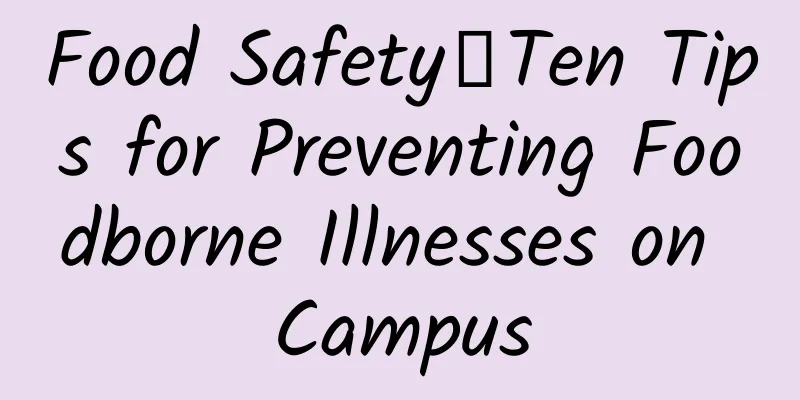Food Safety丨Ten Tips for Preventing Foodborne Illnesses on Campus

|
1. When buying food, you should pay attention to whether the food packaging has the manufacturer, production date, whether it has exceeded the shelf life, whether the food ingredients and nutritional ingredients are marked, and whether there is a QS mark. Do not buy food with incomplete labels such as no factory name, no factory address or no shelf life. 2. Before opening the food package or while eating, if you find any abnormal sensory characteristics, you should stop eating immediately. 3. Do not patronize unlicensed mobile stalls or restaurants with poor hygiene conditions; do not buy or consume low-quality food and drinks sold by street vendors. These low-quality foods and drinks often do not meet hygiene standards and are harmful to health. 4. Do not eat food of unknown origin, cooked food that has been left at room temperature for more than 2 hours, or leftover food. 5. Do not eat food that is rotten, rancid, dirty, moldy, infested with insects, or contains any other harmful or toxic substances. When food rots, it will taste sour, bitter, and emit a strange smell. This is caused by the proliferation of bacteria. Eating these foods can cause food poisoning. 6. Do not eat wild vegetables and fruits casually. There are many kinds of wild vegetables and fruits, some of which contain toxins that are harmful to the human body. It is difficult for inexperienced people to distinguish them clearly. Only by not eating wild vegetables and fruits casually can you avoid poisoning and ensure safety. 7. Fruits and vegetables that are eaten raw or directly should be washed thoroughly with clean water and peeled as much as possible. Fruits and vegetables are not only contaminated with germs, viruses, parasite eggs, but also residual pesticides and insecticides during their growth. If they are not washed thoroughly, they may not only contract diseases, but also cause pesticide poisoning. 8. Eat less fried, deep-fried, grilled foods, as well as hamburgers, instant noodles, carbonated drinks and other high-fat, high-salt, high-sugar foods to reduce the risk of chronic diseases. 9. Do not drink unclean water or unboiled tap water; it is difficult to tell whether the water is clean with the naked eye. Clear and transparent water may also contain bacteria and viruses. It is safest to drink boiled water. 10. Pay attention to personal hygiene. Wash your hands before and after meals to remove germs, viruses and parasite eggs that may be contaminated on your hands, and reduce the possibility of "disease from the mouth"; it is recommended to use public chopsticks and spoons, wash and disinfect your own tableware, and do not use unclean containers to hold food. |
<<: Safe medication: Demystifying the misunderstandings about the use of growth hormone in children
>>: Food Safety | Emergency Measures after Food Poisoning
Recommend
Can I eat apples during menstruation?
Women also have to pay attention to many things d...
What is the pregnancy glucose tolerance test?
During pregnancy, pregnant mothers need to underg...
What does right breast calcification mean?
Right breast calcification is a physiological hyp...
Position map of women's internal organs
The human body structure is complicated and the v...
Can I take probiotics every day?
Probiotics are mainly used to regulate people'...
What brand is Douyin's sake lees mask? How effective is Douyin's sake lees mask?
Recently, I was browsing Douyin and found that ma...
Can I do a vaginal ultrasound in early pregnancy?
Once a woman becomes pregnant, she will have to u...
Will chocolate cysts affect pregnancy?
Many pregnant mothers do not pay attention to the...
Blurred vision during menstruation
If you find your vision blurred during your menst...
Can I eat peanut oil during menstruation?
Peanut oil is the main edible oil in the Jiaodong...
Can pregnant women eat black wolfberry?
Pregnant women need special care during pregnancy...
What should I pay attention to when shaving my pubic area?
Whether male or female, private parts will have h...
What should I do if my menstruation has not come?
Many female friends have encountered this problem...
The best food for women to replenish their vitality
If a woman lacks vitality, it can be said that he...









